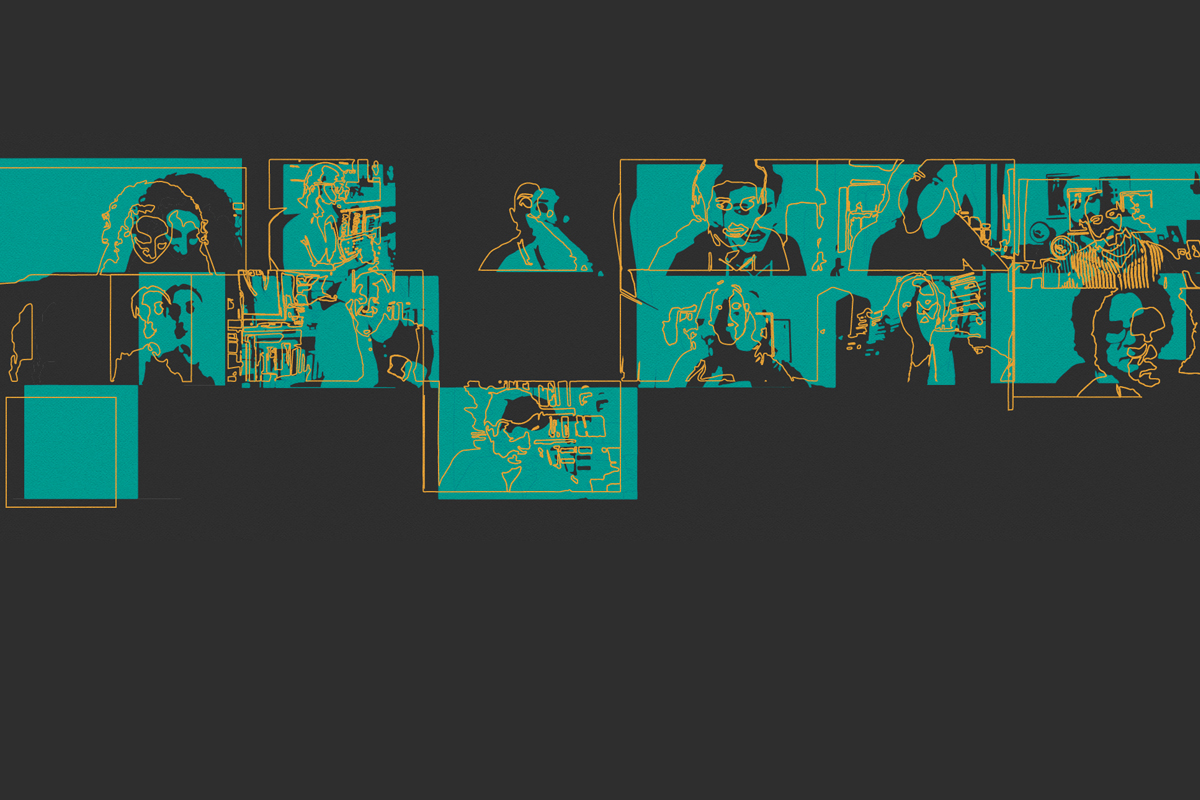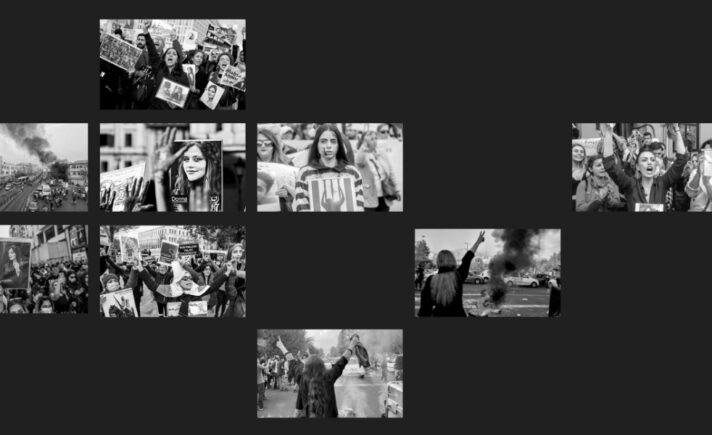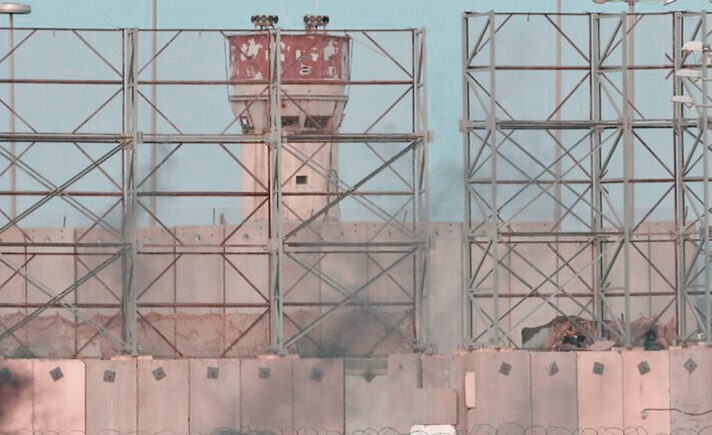[Editor’s note: This article is the first in a series published in collaboration with Mada Masr to mark the tenth anniversary of the Egyptian revolution. It is also available in Arabic.]
It is the tenth anniversary of the Arab Spring, and we can’t quite escape the act of remembrance. Yet, rather than reenacting facile modes of nostalgia or tragic lamentation, we opt to remember with an eye on the present and the future. We ask how the passing of time changes our understanding of the revolutionary event; whether what happened since in words and deeds amount to an Arab revolutionary tradition; and what sites of micro-politics have emerged after 2011 and reconfigured the meaning of politics in the region. In this dual invocation of the dead as well as the living, we aim to confront old and new questions of history and reckoning with the past; of ideology, organization, and national identity; and of those specific areas of contestation that constitute our everyday politics today and could help us to reimagine certain possible futures.
Pregnant as it was with both exuberant hope and boundless brutality, it is as though Arab revolutionary time has since locked us into a tired discursive loop on success and failure. This short essay series, which followed a number of conversations among the authors, is a first attempt to break out of the loop. It’s an invitation to reflect on the past as history, challenging in the process scripted revolutionary or post-revolutionary narratives, eluding factional and/or national silos, and foregrounding hitherto unnoticed dynamics, themes, and voices. As platforms produced in great part by the 2011 moment, we are particularly aware and wary of the fatigue and repetitiveness that Arab Spring discussions and mentions elicit among our communities of writers and readers. This too is part of the brutal everyday that we experience as we attempt to reflect with the angel of history.
*
There is something exhausting in how the Arab Spring is being remembered. There is something exhausting about the very act of remembrance. I am asked identical questions by different journalists on assignment to produce content on the occasion of the ten-year anniversary. I don’t feel my answers matter. The story is somewhat pre-written; the revolution is over and I should somehow confirm it in my answers.
But my answers about the end and the defeat do not arrive, not out of blind hope or political naivete, but out of a certain conceptual blindness cast upon the entire conversation. One time, in an attempt to express candidly how I feel, I try to take my interviewee to a metaphysical area, whereby I speak to her about a spell that accompanies us without us really knowing it, and the redemption we experience when we become conscious of it. I told her this is how a relic of the revolution feels to me. I do not feel she gets me and I even sense she thinks I am troubled.
At the beginning of last year, our friend Salma Shamel generously initiated a reading group on the works of Walter Benjamin; not just to study them, but also to approach them as an epistemological method. The invitation spoke right to my constant need for spaces of praxis in order to keep doing what I am doing with a gist of meaning. Shortly after we started reading together, our weekly evening encounters became an embodiment of what Benjamin is perhaps calling us for: How to redeem a fragment of history in order to respond to the needs of the present?
Calling on what Benjamin writes becomes an attempt to respond to a certain current and urgent need; a need to understand anew, or to understand differently, or to smuggle understanding from predominant processes and forms of knowledge, with what they include in terms of the act of remembering. There are points where I take on my habit to contemplate the very condition in which a process is unfolding; we are a group of scholars, writers, artists, and journalists, mentally wrestling to understand some cryptic writings that arrived to us from the 1940s translated from their original language while most of us are reading them in their second language. At times, we’d feel the victory of arrival and settlement of a certain meaning, and at others we’d keep lingering in our speculations, while reading the same line over and over, hoping for another arrival. I find the energy of this condition quite fitting for the moment, and the crisis it bears: How can we be today? And how can our politics emanate from the intricate act of unearthing and understanding the complex and multilayered reality, away from what we take for granted, theoretically and practically? And where does history fit in this cartography?
Benjamin wrote his text on the concept of history in 1940, made of twenty fragments. We stop at each of them throughout several sessions. He wrote the text before fleeing France as Jewish citizens were being handed over to the Nazi Gestapo and committing suicide shortly after, and sent it to his friend Hannah Arendt, albeit not for the purpose of publishing. Arendt would cross the French border and reach the Spanish side of the Mediterranean where her friend was buried; she would visit him and give a copy of the text to his fellow friends, and of them, Theodor Adorno would take on the task of publishing.
“On the Concept of History” might be a text that responds to the need to raise two questions, among others: How can we adapt the concepts of time, and temporality, to our present realities and our political commitments? And how can we deal with the past from a political, rather than historical, standpoint?
The fundamentals in Benjamin’s concept of history consist of liberating ourselves from committing to the linearity of history, and the view of time as empty and homogenous. Instead, the call is for capturing fragments that intersect with our present. These fragments appear to us in moments of need, moments of crisis, and this is when the intersection between past and present becomes an intensified moment in time, a political moment.
I am re-reading “On the Concept of History” when a friend recalls being part of the Maadi Popular Committee to Safeguard the Gains of the Revolution in 2011. I stop at this act of memory and wonder: How did the hegemony of a centralized linear narrative of the revolution affect these margins, these fragments that we didn’t stop at for too long? There is something both poetic and triumphant in the very name of this committee, let alone something deeply political. I wonder if the Maadi Popular Committee to Safeguard the Gains of the Revolution was perhaps the invisible micropolitics through which we could have re-ordered our understanding of the bigger revolutionary spectacle. Name aside, what was this committee doing back then? Who were its members? How were they organizing and working? What were their goals? And what was their relation to the Maadi neighborhood in a revolution where Tahrir Square dominated its geographic (and political) imaginary? What does this committee tell us of the relation of the local to the political? What could have happened if we allocated more space for it in the historical narrative of the revolution?
The Maadi Popular Committee to Safeguard the Gains of the Revolution seems to be a deviation from the 2011 epic as we know it. Benjamin speaks to us about deviations and roads we didn’t take, and makes us wonder what possibilities are inhumed in there. There is another type of popular committee that resurface to memory from the beginning of the eighteen days of protests, when police retreated from the streets. They were self-tasked with keeping order and security in different neighborhoods. Geographic, demographic, gendered and class differences, among others, animate the bodies of these committees that together form an index of political reality. Power surfaces as these committees take over internalized state power as they defend their neighborhoods from looters and the general state of chaos; those of the affluent Zamalek neighborhood use rafts and pistols, and those of the low-income Imbaba hood stand with their expansive masculine bodies and batons. These committees become a margin we don’t look at often on our way in and to Tahrir, perhaps because it is a confusing detail, one that ousts us from the seeming harmony of the square. The seeming harmony of the square extends to encompass clear fault lines of comradery and enmity. Something in this condition makes me think of Benjamin’s longtime comrades, Adorno and Gershom Scholem, who reportedly absented from his correspondences some letters he wrote to the conservative figure Carl Schmitt. Benjamin had a curiosity toward Schmitt, and the correspondence between them shows a mutual interest in an exchange of readings. Some attribute this intellectual interest to Benjamin’s theological penchants, which are commonly but inaccurately pitted against his views on historical materialism. Away from Scholem and Adorno’s mediation for a progressive Benjamin to arrive to us in writing, what does his rapprochement with Schmitt tell us? Is this a sensibility elastic enough to extend to the revolution-counter-revolution binary that seeks to invent comfort in some imaginary frontiers? What if there are no frontiers?
There is an act of opening closed rooms of history in recalling the popular committees in their different configurations. Benjamin tells us, of these rooms, that they might be the containers of a future we should redeem. It takes ceasing to look at the past as an eternal image but as an ongoing set of experiences.
I am sitting on the other side of the call waiting for the inevitable question for this interview to end: Has the revolution ended? I could just say “yes” and be done. And I fear uttering a “no” and sounding naive. But there is a certain intellectual exactitude, but also an intellectual liberation, in withdrawing from a version of history that’s complete and closed. I try to find words to describe the continuation of the past through this act of capturing its fragments in the present, in the apogee of crisis, in the utmost sentiment of blockage. I try to say that the political sits somewhere here in that act. I don’t know if she will use my words in the end. After all, it’s the one-decade anniversary, and a decade feels like a monument, and a monument indexes something dead.
Maybe we need to surpass this anniversary and all other anniversaries.




